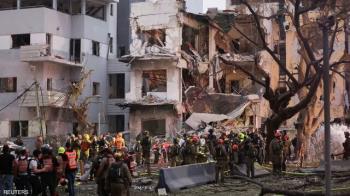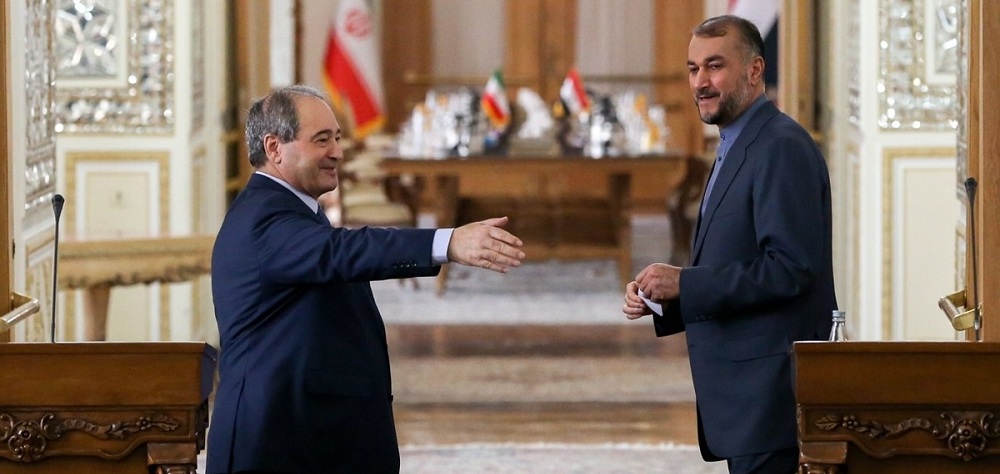Alwaght- Syrian Foreign Minister visited Iran on Sunday. The trip beside its concrete importance was symbolically significant as it is the first visit of a top Syrian diplomat under the new Iranian administration where Sayyed Ibrahim Raeisi is the president and Hussein Amir-Abdollahian is the foreign minister.
Iran and Syria, key members of a powerful regional bloc called Axis of Resistance, have been engaged in tight partnership aimed at foiling the Western-Israeli-Arab-fueled war against the Syrian government and heavy wave of terrorism in the region. The outcome was bringing back stability to Syria and also Iraq and upgrading Tehran-Damascus cooperation to a strategic level. The exchange of visits between the two countries' officials assert ever-developing partnership and adoption of a strategic pathway in their foreign policy.
Maintaining strategic ties with Tehran amid brewing Arab openness to Damascus
The visit to Iran of Faisal Mekdad with a message of closeness of the relations of the two strategic allies in West Asia comes as the Arab and international political atmosphere is moving fast to reopening the diplomatic channels with Damascus and accepting Syria afresh as a legitimate actor on the world stage after a day of boycott.
In recent months, Arab governments have been moving one after the other to normalize relations and reopen their embassies in Syria, and returning Syria seat in the Arab League at upcoming Algeria summit is now a possibility.
In the meantime, some believe that Arab de-escalation with Syria, along with promises of participation in the country's economic and infrastructural reconstruction and possibly even the return of the Arab League's seat to President Bashar al-Assad's government are all aimed at making a balance of influence with Iran in the Arab world and in the face of strategic Tehran-Damascus alliance.
To put it differently, Syria's integration into the Iran-led Axis of Resistance and Damascus's extensive cooperation with Tehran in the post-crisis period have led to widespread criticism among Arab politicians of their governments' actions toward the Syrian government. Their argument is that a decade of Arab hostility and funding terrorism against Syria, while Iran remained a staunch ally and fought terrorism shoulder to shoulder with Syria, gave the Syrian government every reason to unite more with Iran and Resistance bloc.
Given this issue and while it has not been a long time since the UAE foreign minister visited Syria, Mekdad's visit carries a message: Syria pays special attention to maintaining highest-level ties with Tehran and reciprocal Iranian welcome of Arab-Syrian relations boost for good of Syria's transition to peace and prosperity.
Earlier, Mekdad had said that Syria and Iran have "normal" ties and that his country brought back balance to region via its ties with Tehran.
Other reasons for this trip include the need to consult with each other in the new conditions and amid the spirited wave of de-escalation talks and also possible passing of messages between Iran and Arab states via Syria.
Special focus on economic partnership
With the Syrian government and people overcoming the 10-year sedition characterized by terrorist groups and the security crisis, efforts to restore the pre-crisis situation and provide a way for refugees to return home by advancing the economic reconstruction case are on the Syrian government's serious agenda. Meanwhile, Iran, as Syria's strategic partner, is considered as one of the most important actors in the reconstruction case, and the Iranian government has repeatedly stated its readiness to participate in rebuilding Syria.
Building its economic strategy on prioritization of broadening trade exchanges with neighbors, new Iranian government has already started moves to expedite economic cooperation with Syria.
To this end, last week, the Iranian Minister of Industry, Mining, and Trade Sayyed Reza Fatemi Amin headed a high-level economic delegation to Syria. He opened an Iranian trade center in Damascus and together with his Syrian counterpart formed a "joint trade committee". This was beside discussing trade and industry boost and set-off of goods and materials needed by the two countries' markets to neutralize the cruel sanctions imposed on them by the US.
At present, the economic and trade volumes by no means fit the economic capacities and strategic political relations between the two countries. On the eve of Mekdad's visit, Syrian Prime Minister Hussein Arnous had said that economic cooperation should be at the same level as strategic political relations between Syria and Iran.
The trade balance between Iran and Syria in 2020 was $170 million, which according to Keyvan Kashefi, head of the Iran-Syria Joint Chamber of Commerce, will reach $300 million this year and $1 billion is targeted for the near future.
"This trip focuses on the economic aspect, and mainly trade, industry, and investment," said Syrian Economy and Foreign Trade Minister Samer al-Khalil during a reception ceremony arranged for Fatemi Amin.
Therefore, economic partnership boost occupies a major part of diplomatic visits exchanged between Iran and Syria.



























